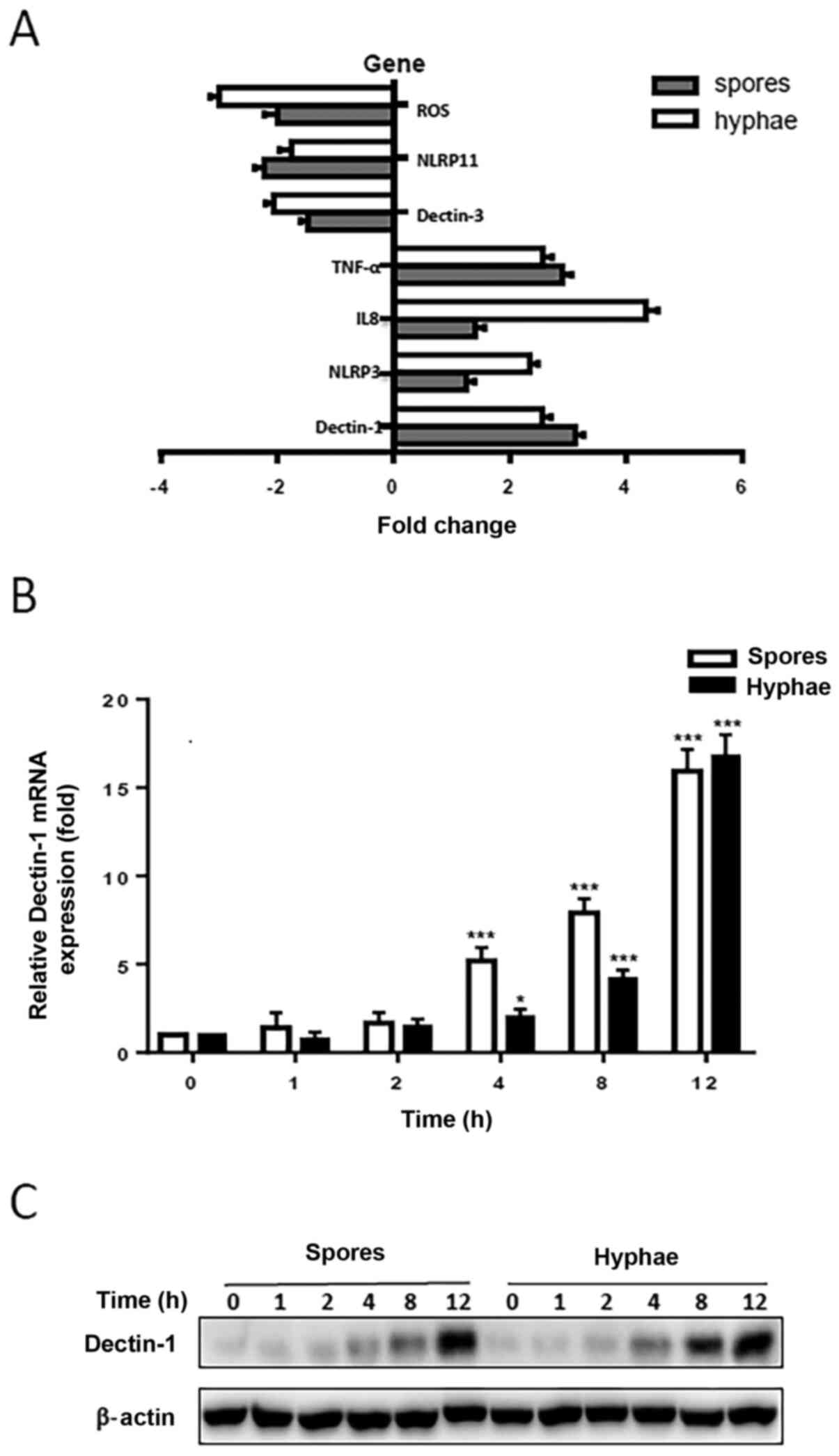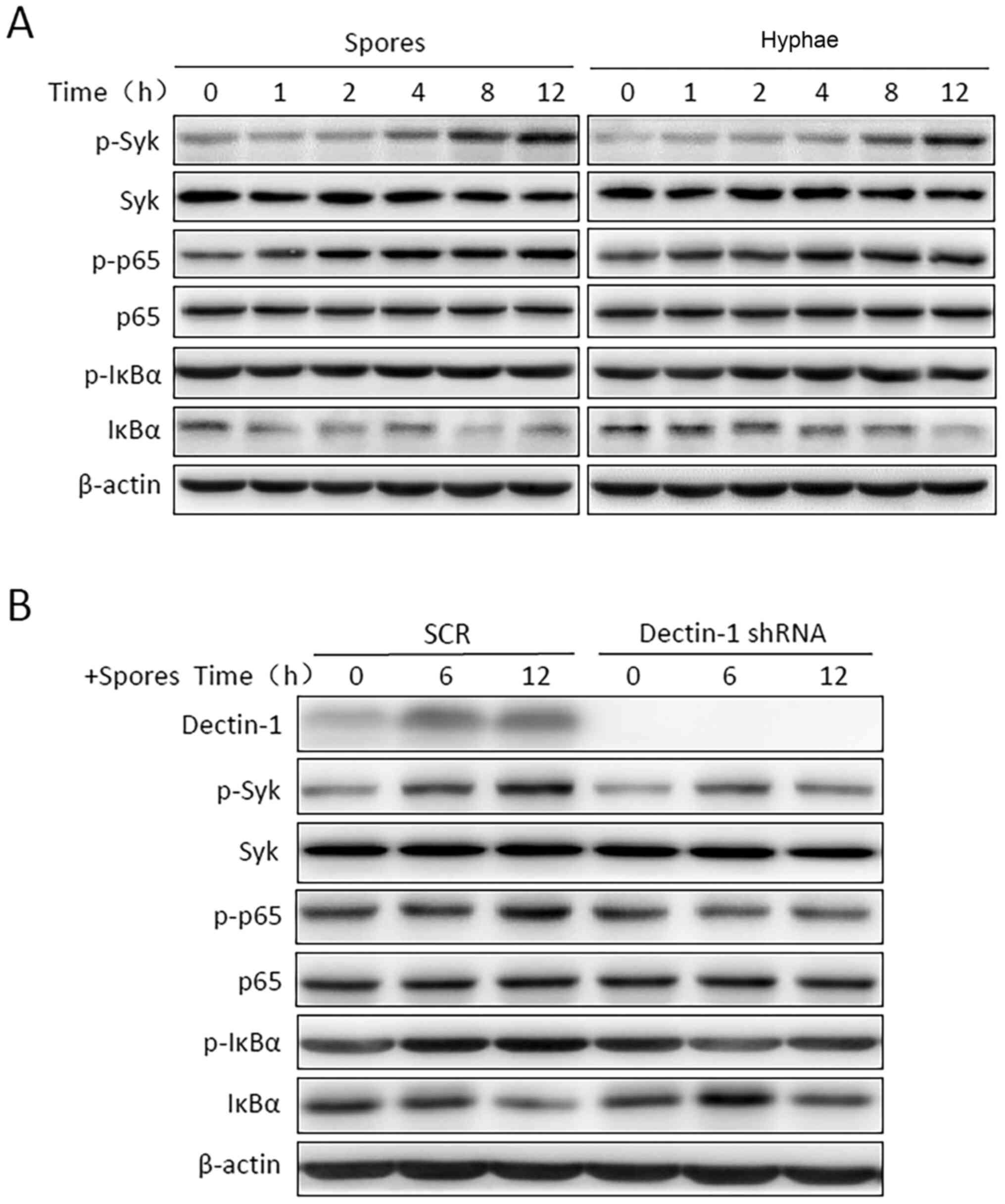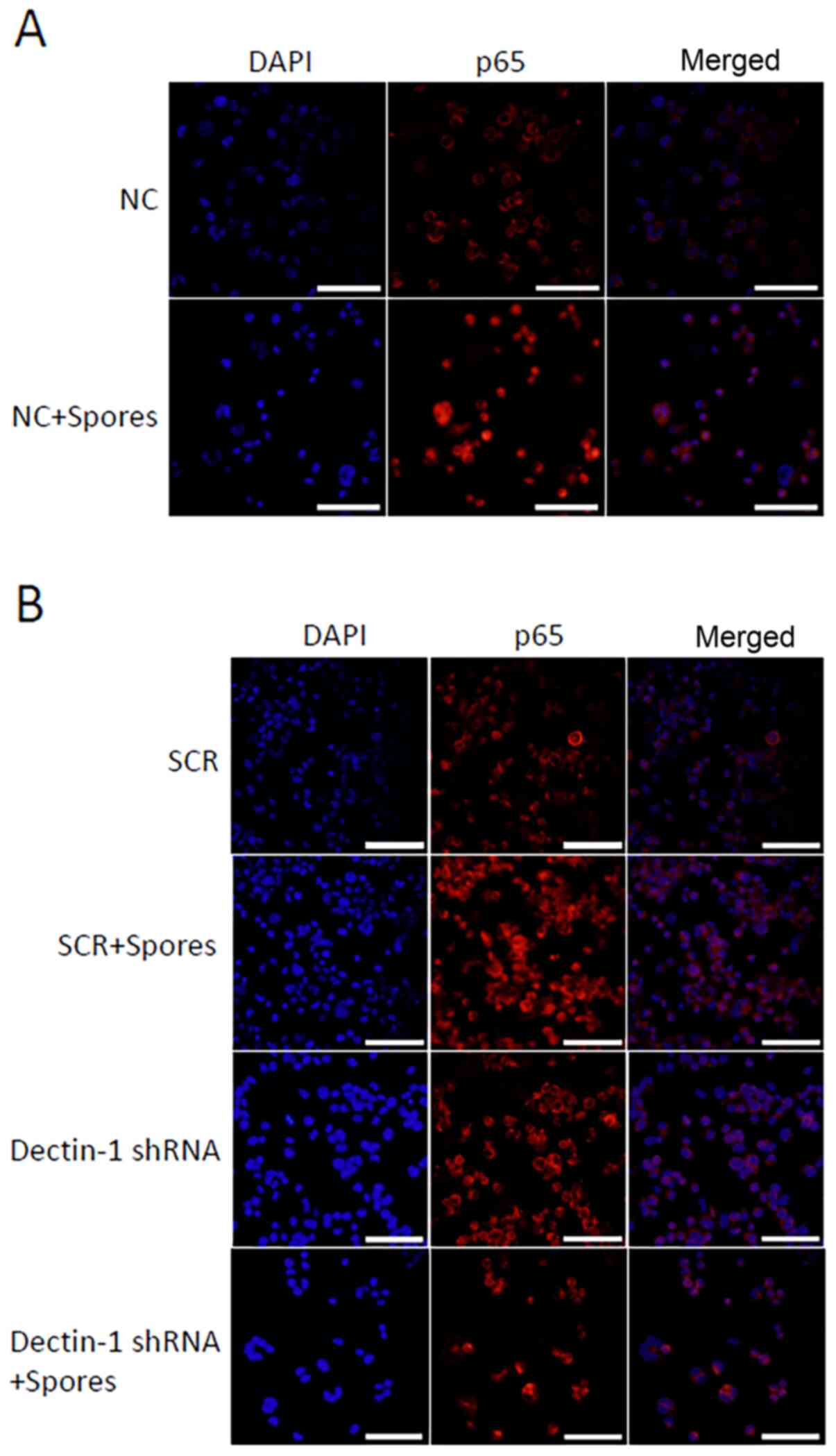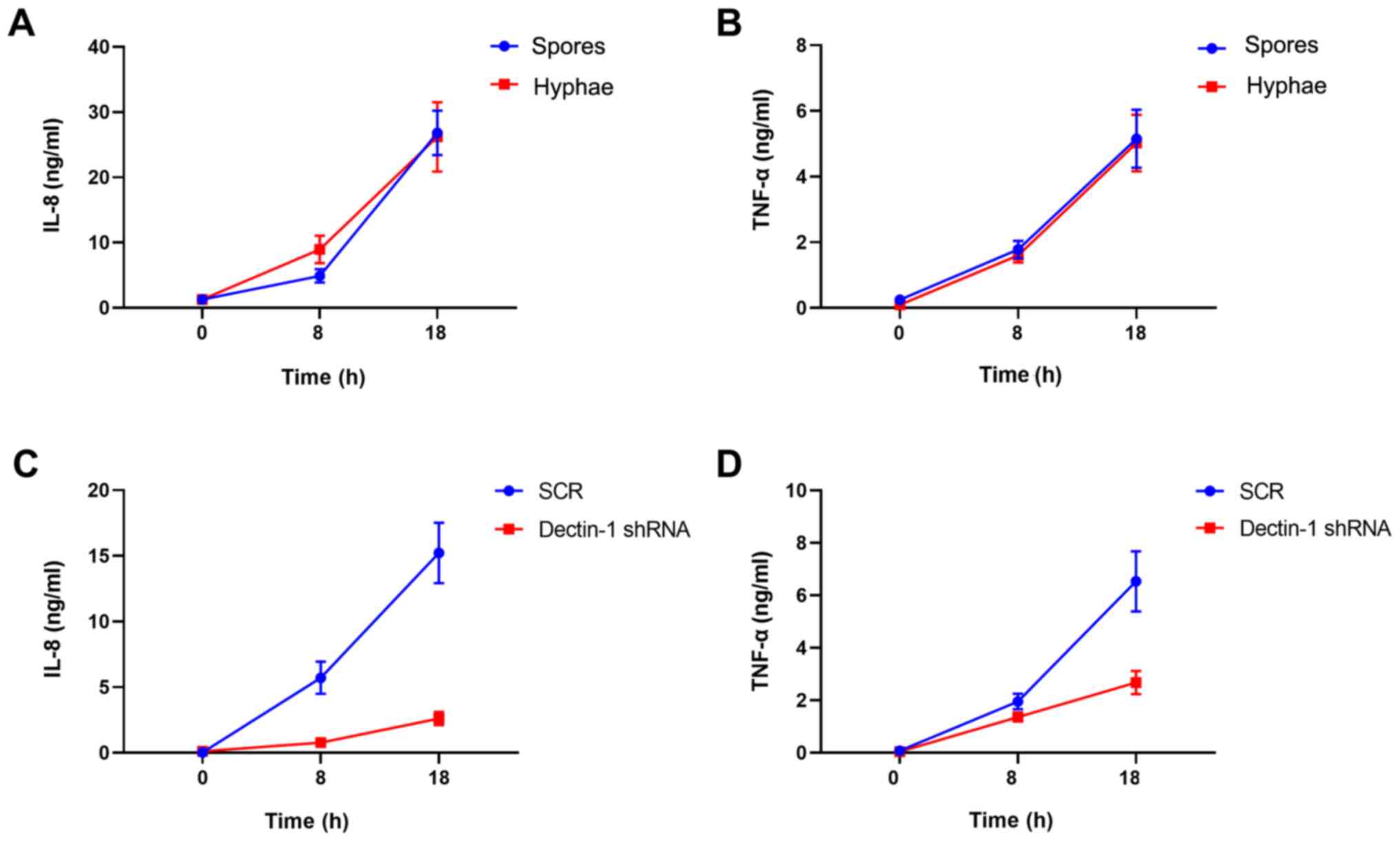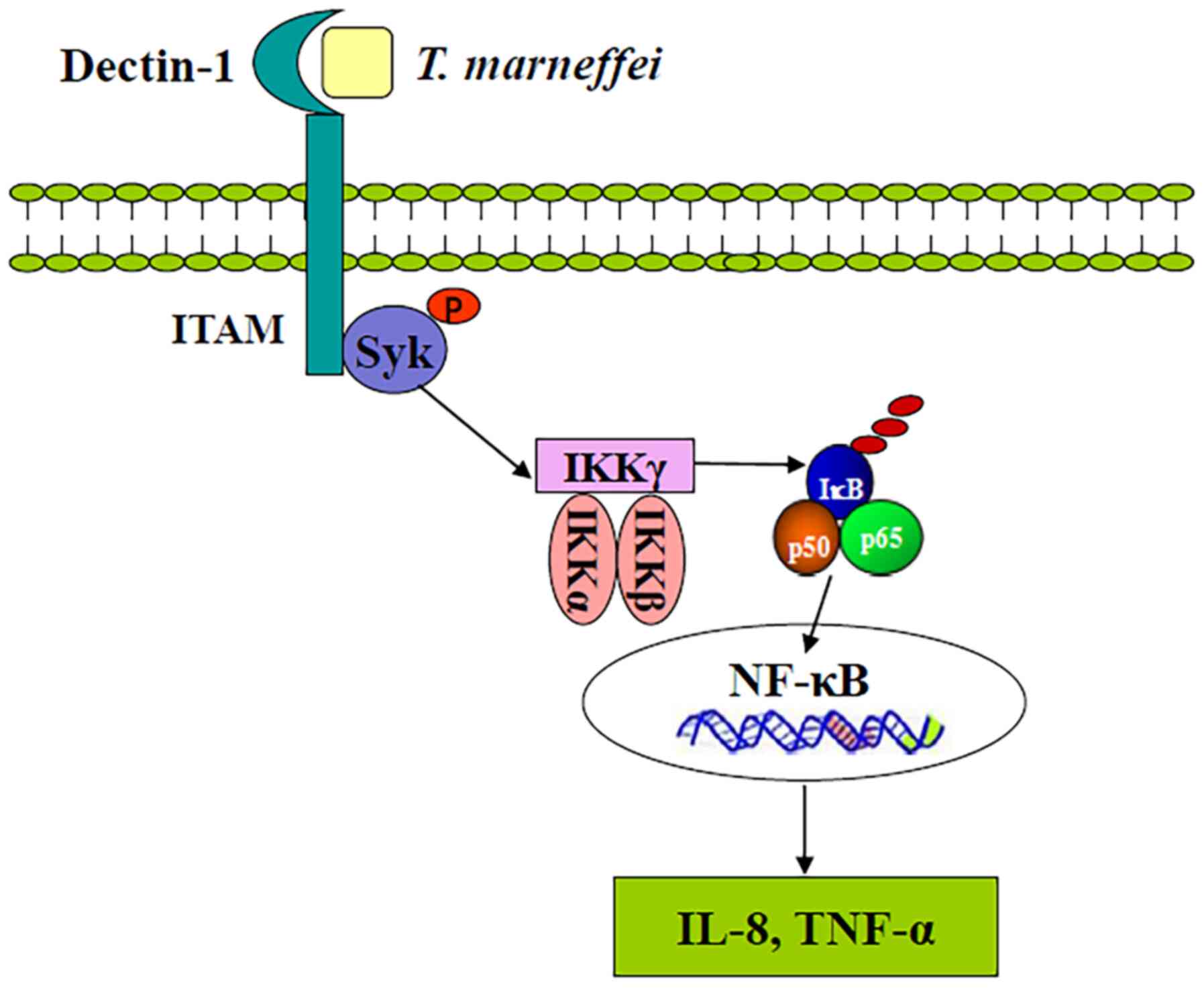|
1
|
Capponi M, Segretain G and Sureau P:
Penicillosis from Rhizomys sinensis. Bull Soc Pathol Exot
Filiales. 49:418–421. 1956.PubMed/NCBI(In French).
|
|
2
|
Segretain G: Penicillium marneffei
n.sp., agent of a mycosis of the reticuloendothelial system.
Mycopathol Mycol Appl. 11:327–353. 1959.PubMed/NCBI View Article : Google Scholar : (In French).
|
|
3
|
Boyce KJ and Andrianopoulos A: Fungal
dimorphism: The switch from hyphae to yeast is a specialized
morphogenetic adaptation allowing colonization of a host. FEMS
Microbiol Rev. 39:797–811. 2015.PubMed/NCBI View Article : Google Scholar
|
|
4
|
Cogliati M, Roverselli A, Boelaert JR,
Taramelli D, Lombardi L and Viviani MA: Development of an in vitro
macrophage system to assess Penicillium marneffei growth and
susceptibility to nitric oxide. Infect Immun. 65:279–284.
1997.PubMed/NCBI View Article : Google Scholar
|
|
5
|
Tsang CC, Lau SKP and Woo PCY: Sixty Years
from Segretain's Description: What Have We Learned and Should Learn
About the Basic Mycology of Talaromyces marneffei?
Mycopathologia. 184:721–729. 2019.PubMed/NCBI View Article : Google Scholar
|
|
6
|
Hu Y, Zhang J, Li X, Yang Y, Zhang Y, Ma J
and Xi L: Penicillium marneffei infection: An emerging
disease in mainland China. Mycopathologia. 175:57–67.
2013.PubMed/NCBI View Article : Google Scholar
|
|
7
|
Le T, Huu Chi N, Kim Cuc NT, Manh Sieu TP,
Shikuma CM, Farrar J and Day JN: AIDS-associated Penicillium
marneffei infection of the central nervous system. Clin Infect
Dis. 51:1458–1462. 2010.PubMed/NCBI View
Article : Google Scholar
|
|
8
|
Sellge G and Kufer TA: PRR-signaling
pathways: Learning from microbial tactics. Semin Immunol. 27:75–84.
2015.PubMed/NCBI View Article : Google Scholar
|
|
9
|
Akira S, Uematsu S and Takeuchi O:
Pathogen recognition and innate immunity. Cell. 124:783–801.
2006.PubMed/NCBI View Article : Google Scholar
|
|
10
|
Salazar F and Brown GD: Antifungal Innate
Immunity: A Perspective from the Last 10 Years. J Innate Immun.
10:373–397. 2018.PubMed/NCBI View Article : Google Scholar
|
|
11
|
Goyal S, Castrillón-Betancur JC, Klaile E
and Slevogt H: The Interaction of Human Pathogenic Fungi With
C-Type Lectin Receptors. Front Immunol. 9(1261)2018.PubMed/NCBI View Article : Google Scholar
|
|
12
|
Sancho D and Reis e Sousa C: Signaling by
myeloid C-type lectin receptors in immunity and homeostasis. Annu
Rev Immunol. 30:491–529. 2012.PubMed/NCBI View Article : Google Scholar
|
|
13
|
Saijo S and Iwakura Y: Dectin-1 and
Dectin-2 in innate immunity against fungi. Int Immunol. 23:467–472.
2011.PubMed/NCBI View Article : Google Scholar
|
|
14
|
Wevers BA, Kaptein TM, Zijlstra-Willems
EM, Theelen B, Boekhout T, Geijtenbeek TB and Gringhuis SI: Fungal
engagement of the C-type lectin mincle suppresses dectin-1-induced
antifungal immunity. Cell Host Microbe. 15:494–505. 2014.PubMed/NCBI View Article : Google Scholar
|
|
15
|
Brown GD: Dectin-1: A signalling non-TLR
pattern-recognition receptor. Nat Rev Immunol. 6:33–43.
2006.PubMed/NCBI View Article : Google Scholar
|
|
16
|
Saijo S, Ikeda S, Yamabe K, Kakuta S,
Ishigame H, Akitsu A, Fujikado N, Kusaka T, Kubo S, Chung SH, et
al: Dectin-2 recognition of alpha-mannans and induction of Th17
cell differentiation is essential for host defense against
Candida albicans. Immunity. 32:681–691. 2010.PubMed/NCBI View Article : Google Scholar
|
|
17
|
Livak KJ and Schmittgen TD: Analysis of
relative gene expression data using real-time quantitative PCR and
the 2(-Delta Delta C(T)) Method. Methods. 25:402–408.
2001.PubMed/NCBI View Article : Google Scholar
|
|
18
|
Limper AH, Adenis A, Le T and Harrison TS:
Fungal infections in HIV/AIDS. Lancet Infect Dis. 17:e334–e343.
2017.PubMed/NCBI View Article : Google Scholar
|
|
19
|
Nakamura K, Miyazato A, Koguchi Y, Adachi
Y, Ohno N, Saijo S, Iwakura Y, Takeda K, Akira S and Fujita J:
Toll-like receptor 2 (TLR2) and dectin-1 contribute to the
production of IL-12p40 by bone marrow-derived dendritic cells
infected with Penicillium marneffei. Microbes Infect.
10:1223–1227. 2008.PubMed/NCBI View Article : Google Scholar
|
|
20
|
Gantner BN, Simmons RM, Canavera SJ, Akira
S and Underhill DM: Collaborative induction of inflammatory
responses by dectin-1 and Toll-like receptor 2. J Exp Med.
197:1107–1117. 2003.PubMed/NCBI View Article : Google Scholar
|
|
21
|
Sun WK, Lu X, Li X, Sun QY, Su X, Song Y,
Sun HM and Shi Y: Dectin-1 is inducible and plays a crucial role in
Aspergillus-induced innate immune responses in human
bronchial epithelial cells. Eur J Clin Microbiol Infect Dis.
31:2755–2764. 2012.PubMed/NCBI View Article : Google Scholar
|
|
22
|
Cohen-Kedar S, Baram L, Elad H, Brazowski
E, Guzner-Gur H and Dotan I: Human intestinal epithelial cells
respond to β-glucans via Dectin-1 and Syk. Eur J Immunol.
44:3729–3740. 2014.PubMed/NCBI View Article : Google Scholar
|
|
23
|
Hayden MS and Ghosh S: Shared principles
in NF-kappaB signaling. Cell. 132:344–362. 2008.PubMed/NCBI View Article : Google Scholar
|
|
24
|
Hinz M and Scheidereit C: The IκB kinase
complex in NF-κB regulation and beyond. EMBO Rep. 15:46–61.
2014.PubMed/NCBI View Article : Google Scholar
|
|
25
|
Zhu LL, Zhao XQ, Jiang C, You Y, Chen XP,
Jiang YY, Jia XM and Lin X: C-type lectin receptors Dectin-3 and
Dectin-2 form a heterodimeric pattern-recognition receptor for host
defense against fungal infection. Immunity. 39:324–334.
2013.PubMed/NCBI View Article : Google Scholar
|
|
26
|
Sun H, Xu XY, Tian XL, Shao HT, Wu XD,
Wang Q, Su X and Shi Y: Activation of NF-κB and respiratory burst
following Aspergillus fumigatus stimulation of macrophages.
Immunobiology. 219:25–36. 2014.PubMed/NCBI View Article : Google Scholar
|
|
27
|
Rogers NC, Slack EC, Edwards AD, Nolte MA,
Schulz O, Schweighoffer E, Williams DL, Gordon S, Tybulewicz VL,
Brown GD, et al: Syk-dependent cytokine induction by Dectin-1
reveals a novel pattern recognition pathway for C type lectins.
Immunity. 22:507–517. 2005.PubMed/NCBI View Article : Google Scholar
|
|
28
|
Duan Z, Chen X, Du L, Liu C, Zeng R, Chen
Q and Li M: Inflammation Induced by Candida parapsilosis in
THP-1 Cells and Human Peripheral Blood Mononuclear Cells (PBMCs).
Mycopathologia. 182:1015–1023. 2017.PubMed/NCBI View Article : Google Scholar
|
|
29
|
Gringhuis SI, den Dunnen J, Litjens M, van
der Vlist M, Wevers B, Bruijns SC and Geijtenbeek TB: Dectin-1
directs T helper cell differentiation by controlling noncanonical
NF-kappaB activation through Raf-1 and Syk. Nat Immunol.
10:203–213. 2009.PubMed/NCBI View Article : Google Scholar
|
|
30
|
Koh TJ and DiPietro LA: Inflammation and
wound healing: The role of the macrophage. Expert Rev Mol Med.
13(e23)2011.PubMed/NCBI View Article : Google Scholar
|
|
31
|
Shapouri-Moghaddam A, Mohammadian S,
Vazini H, Taghadosi M, Esmaeili SA, Mardani F, Seifi B, Mohammadi
A, Afshari JT and Sahebkar A: Macrophage plasticity, polarization,
and function in health and disease. J Cell Physiol. 233:6425–6440.
2018.PubMed/NCBI View Article : Google Scholar
|
|
32
|
Idriss HT and Naismith JH: TNF alpha and
the TNF receptor superfamily: Structure-function relationship(s).
Microsc Res Tech. 50:184–195. 2000.PubMed/NCBI View Article : Google Scholar
|
|
33
|
Aggarwal BB, Gupta SC and Kim JH:
Historical perspectives on tumor necrosis factor and its
superfamily: 25 years later, a golden journey. Blood. 119:651–665.
2012.PubMed/NCBI View Article : Google Scholar
|
|
34
|
Akdis M, Aab A, Altunbulakli C, Azkur K,
Costa RA, Crameri R, Duan S, Eiwegger T, Eljaszewicz A, Ferstl R,
et al: Interleukins (from IL-1 to IL-38), interferons, transforming
growth factor β, and TNF-α: Receptors, functions, and roles in
diseases. J Allergy Clin Immunol. 138:984–1010. 2016.PubMed/NCBI View Article : Google Scholar
|
|
35
|
Zhang W and Chen H: The study on the
interleukin-8 (IL-8)]. Sheng Wu Yi Xue Gong Cheng Xue Za Zhi.
19:697–702. 2002.PubMed/NCBI(In Chinese).
|
|
36
|
Li M, Liu ZH, Chen Q, Zhou WQ, Yu MW, Lü
GX, Lü XL, Shen YN, Liu WD and Wu SX: Insoluble beta-glucan from
the cell wall of Candida albicans induces immune responses
of human THP-1 monocytes through Dectin-1. Chin Med J (Engl).
122:496–501. 2009.PubMed/NCBI
|
|
37
|
Hohl TM, Van Epps HL, Rivera A, Morgan LA,
Chen PL, Feldmesser M and Pamer EG: Aspergillus fumigatus
triggers inflammatory responses by stage-specific beta-glucan
display. PLoS Pathog. 1(e30)2005.PubMed/NCBI View Article : Google Scholar
|















